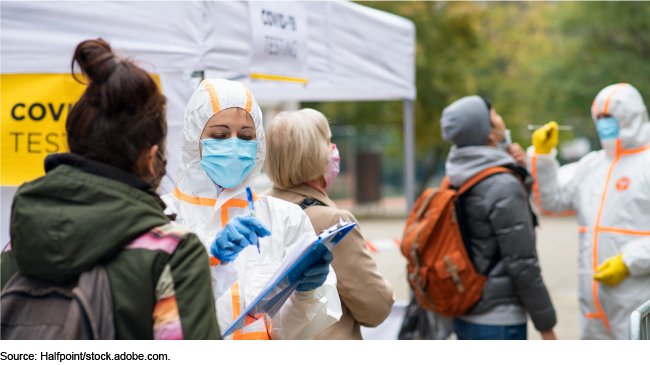Public Health: Leading Practices Could Help Guide HHS Reform Efforts to Address Risk and Improve Preparedness
Fast Facts
Health and Human Services leads and coordinates the federal government's preparedness for and response to public health emergencies.
This testimony discusses our work over the past decade, which identified ongoing, systemic problems with HHS's performance in this role.
These problems affected the nation's response to past emergencies, such as COVID-19. We have identified leading practices HHS agencies, such as the Centers for Disease Control and Prevention, could use in their reform efforts. Following such practices will guide HHS through future emergencies and help Congress oversee these reforms.
This issue is on our High Risk List.

Highlights
What GAO Found
In January 2022, GAO added the Department of Health and Human Services' (HHS) leadership and coordination of our nation's preparedness for, and response to, public health emergencies—including extreme weather events, infectious disease outbreaks and pandemics, and intentional acts—to GAO's High-Risk List. This designation was based on over a decade of GAO work that identified systemic deficiencies at HHS that have hindered the nation's response to the COVID-19 pandemic and to a variety of other past emergencies. These include the H1N1 influenza pandemic, Zika, and Ebola—and extreme weather events, such as hurricanes. HHS's efforts have fallen short in five key areas of an effective national response: (1) clear roles and responsibilities, (2) complete and consistent data, (3) clear and consistent communication, (4) transparency and accountability, and (5) understanding key partners' capabilities and limitations.
In GAO's April 2023 update on this area high-risk area, GAO reported that two agencies within HHS—the Administration for Strategic Preparedness and Response and the Centers for Disease Control and Prevention—are undergoing reforms. These agencies have announced that they believe these reforms will better position them to respond to public health emergencies, among other improvements.
GAO has identified leading practices for successful agency reform efforts. These leading practices indicate that agencies can successfully change if they have (1) clear goals, (2) follow a process to develop proposed reforms, (3) allocate implementation resources, and (4) consider workforce needs during and after the reform.
GAO has shared these leading practices with HHS to use as it implements its planned reforms. These leading practices, along with the prerequisite of sustained leadership commitment, are essential to helping ensure the country is better prepared for future public health emergencies.
It is too soon to tell if HHS's reform efforts will address the deficiencies GAO has identified in its high-risk designation. However, to the extent HHS chooses to follow these leading agency reform practices, they will help the department in its efforts to improve its leadership and coordination of future public health emergencies. The practices can also assist Congress as it oversees HHS's implementation of these reforms.
Why GAO Did This Study
HHS is responsible for leading and coordinating all matters related to federal public health preparedness for, and response to, emergencies. GAO has determined this is an area in need of transformation.
This testimony discusses GAO's prior work related to HHS's leadership and coordination of public health emergencies, and leading practices for successful agency reforms.
This statement is based on the body of work that led GAO to designate this area as high risk, as well as GAO's June 2018 work on successful agency reform efforts.
Recommendations
GAO has made 155 recommendations to HHS to help address deficiencies that GAO has identified in this area since 2007. As of April 2023, 91 of these recommendations remained unimplemented. GAO maintains that implementing these remaining recommendations will strengthen HHS's leadership and coordination of public health emergencies.
